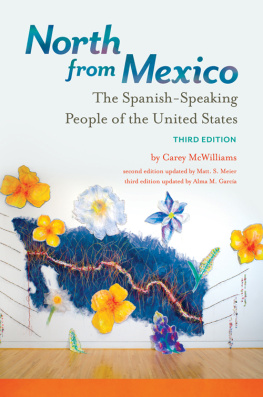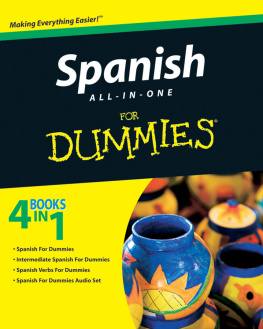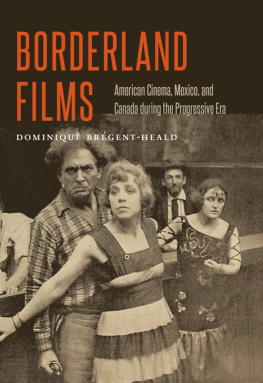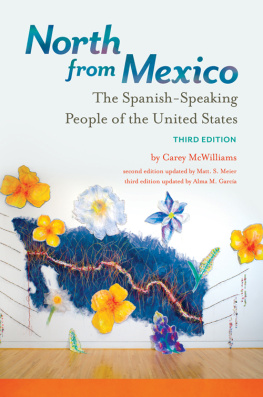

Copyright 1948 by Carey McWilliams. Copyright renewed 1975 by Carey McWilliams. Updated material copyright 1990 by Matt S. Meier. Updated material copyright 2016 by Alma M. Garca.
All rights reserved. No part of this publication may be reproduced, stored in a retrieval system, or transmitted, in any form or by any means, electronic, mechanical, photocopying, recording, or otherwise, except for the inclusion of brief quotations in a review, without prior permission in writing from the publisher.
Library of Congress Cataloging-in-Publication Data
Names: McWilliams, Carey, 19051980. | Meier, Matt S. | Garca, Alma M.
Title: North from Mexico : the Spanish-speaking people of the United States / by Carey McWilliams ; second edition updated by Matt. S. Meier ; third edition updated by Alma M. Garca; foreword by Mario Garca.
Description: Third edition. | Santa Barbara, California : Praeger, an imprint of ABC-CLIO, LLC, 2016. | This book is also available on the World Wide Web as an eBookTitle page verso.
Identifiers: LCCN 2015046909 | ISBN 9781440836824 (hardback : acid-free paper) | ISBN 9781440849855 (paperback : acid-free paper) | ISBN 9781440836831 (electronic)
Subjects: LCSH: Mexican AmericansHistory. | MexicansUnited StatesHistory. | ImmigrantsUnited StatesHistory. | Southwest, NewHistory. | United StatesEthnic relationsHistory. | United StatesEmigration and immigrationHistory. | MexicoEmigration and immigrationHistory. | BISAC: SOCIAL SCIENCE / Ethnic Studies / Hispanic American Studies.
Classification: LCC E184.M5 M394 2016 | DDC 973/.046872dc23 LC record available at http://lccn.loc.gov/2015046909
ISBN: 978-1-4408-3682-4 (cloth)
978-1-4408-4985-5 (paper)
EISBN: 978-1-4408-3683-1
201918171612345
This book is also available on the World Wide Web as an eBook.
Visit www.abc-clio.com for details.
Praeger
An Imprint of ABC-CLIO, LLC
ABC-CLIO, LLC
130 Cremona Drive, P.O. Box 1911
Santa Barbara, California 93116-1911
This book is printed on acid-free paper 
Manufactured in the United States of America
For Iris.
Contents
Foreword
Mario T. Garca
I received my MA in history at the University of Texas at El Paso (UTEP) in 1968. I tried to get a community college job in different parts of the country but to no avail. One day in early spring of 1969, while looking at the job listings at the student center, I saw a notice that some recruiters from San Jose State College (later San Jose State University) were coming to campus and were interested in interviewing students with an MA for possible teaching positions on their campus. I dont think there was a reference to Chicano candidates, but I signed up and had an interview. Little did I know that Chicano students at San Jose State, as part of the emerging Chicano movement, had demonstrated for Chicano studies classes and Chicano professors. To my surprise, about a month later, I received a letter offering me an appointment as a lecturer in history to commence that fall. I would teach four introduction classes to U.S. history each semester. Not having any other job possibilities, I eagerly accepted, even though it meant leaving my hometown and my family. I looked forward to this new opportunity.
However, a few weeks later, the chair of the History Department wrote to me again and asked if I would like to do a Chicano history course. In fact, I would replace two of the U.S. history classes that fall with two Chicano history classes. I was intrigued about taking this on and agreed to do so. The Chicano movement, influenced by the struggle of Csar Chvez and migrant farmworkers plus urban unrest led by Chicano students, had not really reached El Paso. I knew something about all of this, including the land-grant movement in nearby northern New Mexico led by Reies Lpez Tijerina, but was not very well versed in the movement. More importantly, although I had studied the history of Mexico and U.S. Western history, I didnt know much about what constituted Chicano history. Still, I had no choice but to look forward to the summer when I would try to piece together enough material to teach one of the first Chicano history courses in the country.
But this dramatically changed later that spring when I met Professor Ramn Eduardo Ruiz, from Smith College in New England, who had been invited to give a lecture at UTEP. I went to his lecture on the U.S.-Mexico War and the history faculty went out of their way to introduce me to Ruiz, a Mexican-American born in San Diego. Meeting Ruiz and spending some time with him was a huge break. I would later work on my PhD with Ruiz as my mentor at the University of California at San Diego, but on this occasion, when I told him that I was going to teach two Chicano history classes that fall and that I didnt know where I would find materials, he said to me, Read Carey McWilliamss North from Mexico. I had never heard of McWilliams or his book. Taking Ruizs advice, I learned that McWilliams had first published his book in 1948 and that it had just been republished in a new hardback edition by Greenwood Press. I ordered a copy of the book, which I still have. This was a game changer! McWilliams, to my surprise, had written the first history of Mexican-Americans in the United States, or what he called the Spanish-speaking people of the country. His coverage went from the Spanish colonial period of the Southwest to just after World War II. Here were my lectures! Here was my contextualization and periodization of how to teach a Chicano history course. It was not comprehensive and didnt cover the later period of the Chicano movement, but it was a gold mine as far as I was concerned.
That summer of 1969 I spent all of my time taking copious notes from North from Mexico and trying to organize the material into specific lectures. McWilliams gave me the Spanish borderlands, the U.S.-Mexico War, the post-Mexican War period, the beginning of mass immigration from Mexico in the early twentieth century, the effects of the Great Depression and Mexican-American labor upheavals, the Zoot Suit Riots, Mexican-American participation in World War II, and the immediate postwar conditions. This became the organization for my lectures. I had never encountered this history before. I never had a Chicano history class at UTEP because there were none until the early 1970s. For my generation of Chicano historians, McWilliams was essential. It became our bible. It was a lifesaver, or at least a professional lifesaver. There was literally nothing else we could use to teach the initial Chicano history courses.
North from Mexico is a classic, and McWilliams is the godfather of Chicano history. Contemporary Chicano historiography begins with McWilliams. For my graduate course on Chicano historiography, I have the students first read North from Mexico. The text not only influenced those of us who had the responsibility to teach the early Chicano history courses but also influenced the early themes of Chicano historiography. What themes? While it does not commence Chicano history with the indigenous populations in Mexico and the Southwest, it does stress the importance of the Spanish colonial period as being complex and heterogeneous, including the mixing of Spanish and Indians in the Spanish borderlands or El Norte. Recognizing the results of mestizaje that produced mixed peoples and mixed or hybrid cultures, McWilliams set down the foundation of Chicano history. His discussion of the U.S.-Mexico War (18461848) as a war of Anglo-American manifest destiny, expansion, and conquest would resonate with the Chicano movement, and early Chicano historians took up this theme and expanded it to introduce the theory of internal colonialism or the idea that Chicanos first began their U.S. experience as a conquered people and hence represented a colonized group within the belly of the beast. The uprooting and racist treatment of the first generation of Mexican-Americans, or what I call the conquered generation, in the Chicano history that McWilliams treats also introduces what later scholars of race call racialization or the political and economic roots of racism. This racialization is further applied to the first large wave of Mexican immigrants in the early twentieth century, and indeed, it is institutionalized through Mexican jobs, Mexican wages, Mexican barrios, and the infamous or bad Mexican schools. McWilliams doesnt use the term racialization but later Chicano historians would tease it out of his text. Chicano historians would be further affected by McWilliamss discussion of the Mexican Revolution of 1910 and its impact on these early Mexican immigrants. The Mexican immigrant strikes, especially in the fields and mines of the Southwest in the 1920s and 1930s, motivated Chicano historians who sought a radical historical heritage and the history of working-class Mexicans in the United States. In his autobiographical treatment of the 1943 Zoot Suit Riots in Los Angeles, McWilliams helped Chicano historians and Chicano Movement activists rediscover the
Next page









